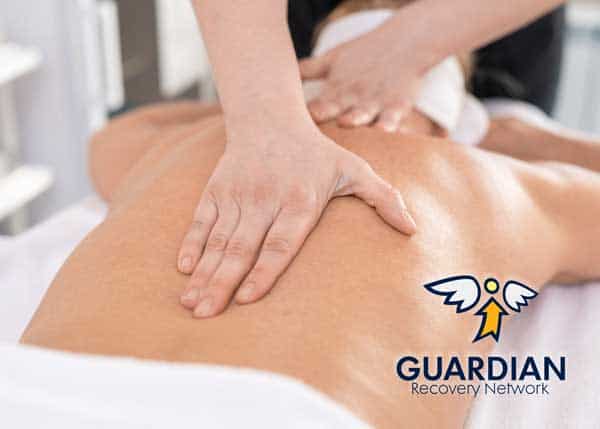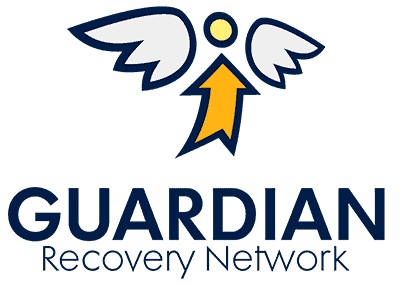Holistic Healing Methods Massage Therapy
Massage therapy is an evidence-based technique that has numerous proven benefits, ranging from pain management to the alleviation of post-acute withdrawal symptoms. Massage therapy is a holistic approach to addiction recovery. The practice is drawn from Eastern medicine rather than Western medicine and focuses on restoring mental and emotional well-being along with physical health.
At Guardian Recovery we focus on a “whole person” approach to addiction recovery, providing our clients with a range of evidence-based holistic treatment options during every stage of the recovery process. To learn more about massage therapy and the other holistic services we provide, contact us today.
What is Massage Therapy?
During a massage therapy session, a licensed massage therapist manipulates the soft tissue throughout the body using a range of intentional movements and varying degrees of pressure. The massage therapist works the skin, the ligaments, the connective tissue, the muscle and the tendons.
Massage therapy has repeatedly proven to reduce pain throughout the body as well as the stress and the tension the physical body stores. There have been numerous studies conducted on the benefits of massage when it comes to addiction treatment.

The benefits of massage therapy:
- The alleviation of chronic pain
- Helping to alleviate stress and helping people cope with high-stress situations
- A reduction of post-acute withdrawal symptoms, which could include chronic fatigue, persistent headaches and general feelings of physical discomfort
- Improved sleep and an alleviation of insomnia and other sleep-related issues
- An increased ability to relax
- Improved immune system function (which is harshly compromised by active addiction)
- Reduced psychological drug and alcohol cravings
- Improved mood through the release of endorphins
- Increased feelings of self-awareness/an awareness of the body
When is Massage Offered?
At Guardian Recovery some of our treatment programs offer massage therapy as part of the Stabilization and Motivation phases of our multi-phased approach to addiction recovery. Massage therapy is an especially useful tool when it comes to detoxification. Massage therapy helps improve vascular function and significantly increases blood flow. Chemical substances are released from the physical body at a more rapid rate, and the detox process as a whole is sped up a significant amount.
An article published by the US National Library of Medicine states, “Massage is thought to be clinically useful for increasing awareness of tension, cueing individuals to sensory symptoms of stress and habitual patterns of responding to stress that may be important for relapse prevention. Touch therapies used in alcohol treatment have produced decreases in physiological and psychological symptoms of stress as well as self-reported symptoms of alcohol withdrawal.”
This is just one of many studies that points towards extensive benefits of massage therapy for addiction treatment.
Massage Therapy & Trauma
At Guardian Recovery we provide individualized treatment options with a focus on unresolved trauma. Trauma and addiction often go hand-in-hand — many men and women who experience trauma early on in life turn to drugs and alcohol as a means of self-medication. Massage therapy is an exceptionally beneficial tool when it comes to helping men and women work through unresolved trauma. People who experience trauma often have a deep-seated aversion to human touch. This is partially based on mistrust and partially based on an inability to be emotionally vulnerable and open with other people.
Women are particularly impacted by issues pertaining to unresolved trauma. The US National Library of Medicine reports that “experiences of sexual and physical abuse in both childhood and adulthood are commonly reported by women in addiction treatment. Whether or not they result in full-blown post-traumatic stress disorder (PTSD), such experiences can impair development of sense of self, lead to decreased belief in control over one’s body, and result in maladaptive coping strategies, such as dissociation, suppressed affect, or hypervigilance. Rates of traumatic abuse among patients with comorbid substance use disorder (SUD) and eating disorder are nearly double that of those with eating disorders without a SUD, suggesting an association with abuse history that may explain these high comorbidity rates. Post-treatment, women are also particularly vulnerable to relapse as a result of interpersonal stress.”
Guardian Recovery‘s focused recovery programs focus on addiction and all underlying issues, including unresolved trauma and behavioral addictions like eating disorders. We utilize a range of proven treatment methods — including massage therapy — to provide the most comprehensive and effective clinical care available. Trauma is often stored in the body, so the physicality of massage therapy can be extremely helpful for individuals with trauma.
Massage & Mindfulness
Massage therapy also helps facilitate the sense of mindfulness that is crucial to the maintenance of long-term sobriety. Mindfulness refers to an authentic level of self-awareness. Developing a sense of mindfulness helps clients stay grounded in the present moment and work through emotions as they crop up without judgement.
According to the same article about addiction and mindfulness published by the NLM, “Mindfulness-based approaches have generated growing interest as one such set of strategies that may address the neurobiological and cognitive-emotional substrata of maladaptive stress responses in SUDs. Mind-body therapies, in general, address the relationship between somato-emotional awareness, coping, and emotional regulation and teach integrative strategies that may help individuals react more effectively to stress and negative emotions.”
Clients work one-on-one with massage therapists who help them foster a sense of self-awareness. Mindfulness and massage therapy pair very well together. Clients learn which parts of the physical body hold emotional stress, and they further develop a mind-body connection.
Massage Therapy & Aftercare
For some clients, the benefits of massage therapy extend beyond medical detox and residential inpatient treatment. This is especially true for clients who are looking for non-invasive ways to cope with chronic pain and other chronic health conditions. At Guardian Recovery we work closely with numerous licensed massage therapists in Maine, New Hampshire, Colorado, South Florida and New Jersey. We are happy to recommend a reputable massage therapist with a personal background in substance abuse recovery to anyone in need. If a client experiences immense relief from massage therapy while he or she is in residential inpatient, Partial Hospitalization or Intensive Outpatient Treatment, massage therapy would probably be beneficial on an ongoing basis. Our Case Managers can help incorporate this into an individual’s personalized aftercare plan.
An Integrative Approach to Recovery
At Guardian Recovery we combine intensive therapeutic care, the 12-steps and a range of proven holistic techniques in order to provide our clients with the most integrated care available. While massage therapy is not equally as effective for each individual client, it can serve as an important part of a comprehensive treatment program. Massage therapy is especially beneficial for men and women who struggle with unresolved trauma or who developed a painkiller addiction after being prescribed it for a chronic pain-related condition. Pain management is an important piece of the recovery puzzle, and massage therapy often proves to be a major player.
Active addiction is a unique experience for every one of our clients, and because of this, no two recovery programs are identical. If a client finds that massage therapy is especially beneficial, he or she will have increased access to this specific service, and ongoing massage therapy will be incorporated as part of his or her aftercare plan. To learn more about this particular holistic approach to healing, or to learn more about our recovery program as a whole, contact us today.
Get Started Now
Give us a call 24/7


